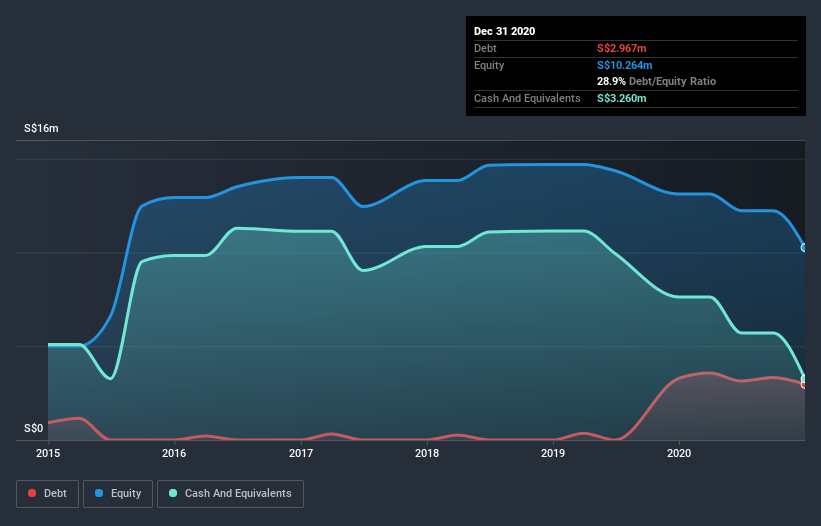- Hong Kong
- /
- Commercial Services
- /
- SEHK:8027
Health Check: How Prudently Does KPM Holding (HKG:8027) Use Debt?
Some say volatility, rather than debt, is the best way to think about risk as an investor, but Warren Buffett famously said that 'Volatility is far from synonymous with risk.' So it might be obvious that you need to consider debt, when you think about how risky any given stock is, because too much debt can sink a company. As with many other companies KPM Holding Limited (HKG:8027) makes use of debt. But is this debt a concern to shareholders?
When Is Debt A Problem?
Generally speaking, debt only becomes a real problem when a company can't easily pay it off, either by raising capital or with its own cash flow. In the worst case scenario, a company can go bankrupt if it cannot pay its creditors. While that is not too common, we often do see indebted companies permanently diluting shareholders because lenders force them to raise capital at a distressed price. Of course, debt can be an important tool in businesses, particularly capital heavy businesses. When we examine debt levels, we first consider both cash and debt levels, together.
View our latest analysis for KPM Holding
What Is KPM Holding's Debt?
The image below, which you can click on for greater detail, shows that KPM Holding had debt of S$2.97m at the end of December 2020, a reduction from S$3.28m over a year. However, its balance sheet shows it holds S$3.26m in cash, so it actually has S$292.8k net cash.

How Healthy Is KPM Holding's Balance Sheet?
We can see from the most recent balance sheet that KPM Holding had liabilities of S$2.77m falling due within a year, and liabilities of S$2.66m due beyond that. On the other hand, it had cash of S$3.26m and S$7.36m worth of receivables due within a year. So it can boast S$5.18m more liquid assets than total liabilities.
This surplus strongly suggests that KPM Holding has a rock-solid balance sheet (and the debt is of no concern whatsoever). With this in mind one could posit that its balance sheet means the company is able to handle some adversity. Succinctly put, KPM Holding boasts net cash, so it's fair to say it does not have a heavy debt load! There's no doubt that we learn most about debt from the balance sheet. But it is KPM Holding's earnings that will influence how the balance sheet holds up in the future. So if you're keen to discover more about its earnings, it might be worth checking out this graph of its long term earnings trend.
Over 12 months, KPM Holding made a loss at the EBIT level, and saw its revenue drop to S$6.4m, which is a fall of 25%. That makes us nervous, to say the least.
So How Risky Is KPM Holding?
We have no doubt that loss making companies are, in general, riskier than profitable ones. And the fact is that over the last twelve months KPM Holding lost money at the earnings before interest and tax (EBIT) line. And over the same period it saw negative free cash outflow of S$2.1m and booked a S$3.4m accounting loss. While this does make the company a bit risky, it's important to remember it has net cash of S$292.8k. That kitty means the company can keep spending for growth for at least two years, at current rates. Even though its balance sheet seems sufficiently liquid, debt always makes us a little nervous if a company doesn't produce free cash flow regularly. The balance sheet is clearly the area to focus on when you are analysing debt. But ultimately, every company can contain risks that exist outside of the balance sheet. For example KPM Holding has 4 warning signs (and 2 which make us uncomfortable) we think you should know about.
Of course, if you're the type of investor who prefers buying stocks without the burden of debt, then don't hesitate to discover our exclusive list of net cash growth stocks, today.
If you decide to trade KPM Holding, use the lowest-cost* platform that is rated #1 Overall by Barron’s, Interactive Brokers. Trade stocks, options, futures, forex, bonds and funds on 135 markets, all from a single integrated account. Promoted
Valuation is complex, but we're here to simplify it.
Discover if KPM Holding might be undervalued or overvalued with our detailed analysis, featuring fair value estimates, potential risks, dividends, insider trades, and its financial condition.
Access Free AnalysisThis article by Simply Wall St is general in nature. It does not constitute a recommendation to buy or sell any stock, and does not take account of your objectives, or your financial situation. We aim to bring you long-term focused analysis driven by fundamental data. Note that our analysis may not factor in the latest price-sensitive company announcements or qualitative material. Simply Wall St has no position in any stocks mentioned.
*Interactive Brokers Rated Lowest Cost Broker by StockBrokers.com Annual Online Review 2020
Have feedback on this article? Concerned about the content? Get in touch with us directly. Alternatively, email editorial-team (at) simplywallst.com.
About SEHK:8027
KPM Holding
An investment holding company, engages in the design, fabrication, installation, and maintenance of signage and related products in Singapore and the People’s Republic of China.
Flawless balance sheet and slightly overvalued.
Market Insights
Community Narratives




